Text
“Show Don’t Tell”? Not Always. Here’s When to Use Summary.
I was inspired to write this post after getting a great anonymous question in my Ask: “What’s your opinion on the whole ‘show don’t tell’ advice? Do you have any tips for when to show and when to tell?”
Here’s my response:
I honestly think that “show don’t tell” is one of the most over-quoted and least-understood pieces of writing advice out there.
For those of you who aren’t familiar, “show don’t tell” means that instead of explaining or telling something to your reader (“Sheila was reckless and impulsive”), you should show Sheila’s impulsiveness through action or dialogue. For example, “Even though her rent was overdue, after she got her paycheck Sheila spent $400 on an antique toilet.” This would allow the reader to draw the conclusion that Sheila was impulsive for themselves, rather than being told.
Theoretically, this is great advice for new fiction writers, who, left to their own devices, tend to write their stories entirely in “telling” mode.
But summary (telling) has a place in fiction as well, and it’s an important one.
For one thing, summary allows you to pace your story. If everything is shown in the moment, a story can sometimes seem to be unfolding with breathtaking speed. Alternating with a bit of summary allows your reader to slow down for a break every once in a while.
Secondly, scene takes a lot longer to write than summary. In the earlier example, it might take several scenes or hundreds of words to thoroughly show and convince the reader of Sheila’s impulsiveness. Whereas the sentence “Sheila was impulsive” takes three words. So summary can allow you to fit more into your story or novel and keep it a reasonable length whereas if you wrote every single little thing that happened in scene your story might be prohibitively long.
So summary helps control the pacing of the story and also helps the writer moderate the story’s length.
Even the most fervent supporters of “show don’t tell,” as far as I know, do not dispute that every story can make use of and benefit from summary.
Try it yourself: Pick up your favorite story or book off of the shelf and see if you can locate parts of the story that are told, explained, or summarize to the reader. It’s there. It’s part of the package. Good writers use summary, and they know how to use it well.
So how do you decide when and where to use summary?
The answer is in itself another question and topic. But here’s a quick guideline:
Use summary to give the reader any information she needs which is not important enough to the story to warrant a scene, or to show the passing of time between important parts of the story.
Example #1 Using summary to quickly present inconsequential information.
If the fact that Sheila is reckless and impulsive is a central part of the story—maybe this is a story about how Sheila, your protagonist, learns to overcome her impulsiveness, for example, or maybe in this story it becomes a major issue in Sheila’s relationship that she is impulsive, etc.—then by all means show Sheila’s impulsiveness in scenes.
But if Sheila is, for example, a minor character who is only mentioned by two or three times in passing, and whose behavior doesn’t really affect the story one way or another, then go ahead and summarize Sheila’s behavior. For example, if Sheila is a distant cousin of the protagonist and is only mentioned in a few sentences when the protagonist bumps into her at a family reunion. She is not a central part of the story, but for whatever reason it’s important for the reader to know a few minor details about her.
Example #2: Using summary to show time passing between important scenes.
If your story is about a couple being trapped inside a cabin for a long winter, by all means show the bitter cold days in full scene. That’s the essence of your story, you wouldn’t want to summarize it and deny the reader the chance to experience it.
But if your story is about two friends who share a friendship at summer camp every year, you might want to recap the winter that passed between their visits in a paragraph or two.
Another time to quickly summarize time passing is to use a sentence or two when characters transition from one important location to another, e.g. “They left the movie, drove back to the house, and started dinner.” Again, check up on your favorite writers. I promise you they are not showing every single tiny action blow-by-blow. It would be tedious as hell and make it almost impossible for the reader to figure out what’s important and what’s not.
A few final words about “show don’t tell”:
If you’re having a hard time deciding what to put in scene and what to put in summary, you might not understand your story well enough yet. Go back and make some notes, or have someone you trust read your story and give you feedback.
Everyone has different levels of tolerance for summary and exposition. Find out yours. You want to be the kind of writer that you would want to read, right? Go through your favorite short stories and novels with a highlighter and highlight any passages or sentences that are telling. Are you the kind of reader who loves a page of summary about the snow falling outside, or do you prefer your stories to be more action-heavy?
There is a lot of bad advice out there about showing versus telling. Some writers would have you write: “She sighed deeply as a single crystalline tear gently glided down her face, tracing the line of her button nose before splashing onto the yellow formica countertop” instead of “She cried.” “She cried” is not telling! Cried is a verb: it shows. “She was sad” or “She was upset” is telling.
Similarly, beware of anyone who applies the “show don’t tell” advice prescriptively, or who seems to be repeating it like a parrot. Those people usually don’t know what they’re talking about. They heard that advice somewhere, and they’re just repeating it. Anytime anyone reads your writing and says, “You should show more,” without giving any further explanation, question them. Get them to specifically tell you what they’re talking about. If they can’t, find someone else to look at your writing.
Summary doesn’t have to be boring. When it is appropriate to summarize, look for ways to add verbs and sensory details to your summaries to keep them more vivid. Give your reader something to visualize. “My father was restless” is hard to visualize. “My father was like a squirrel on cocaine. By the time I woke up, he’d been out in the yard for hours, stuffing Easter eggs into his pocket like they were acorns,” is, well, absurd. But easier to visualize.
/ / / / /
@theliteraryarchitect is a writing advice blog run by me, Bucket Siler, a writer and developmental editor. For more writing help, download my Free Resource Library for Fiction Writers, join my email list, or check out my book The Complete Guide to Self-Editing for Fiction Writers.
5K notes
·
View notes
Text
big fan of characters who have it all under control when theyre put in situations but no idea how to be like a regular guy doing regular stuff when all is said and done.
16K notes
·
View notes
Text
the struggle of loving to put together needlessly complex lore and neverending casts of characters but knowing that almost nobody likes to partake in that. oh well! i'm having fun and that's what matters most :3
1 note
·
View note
Text
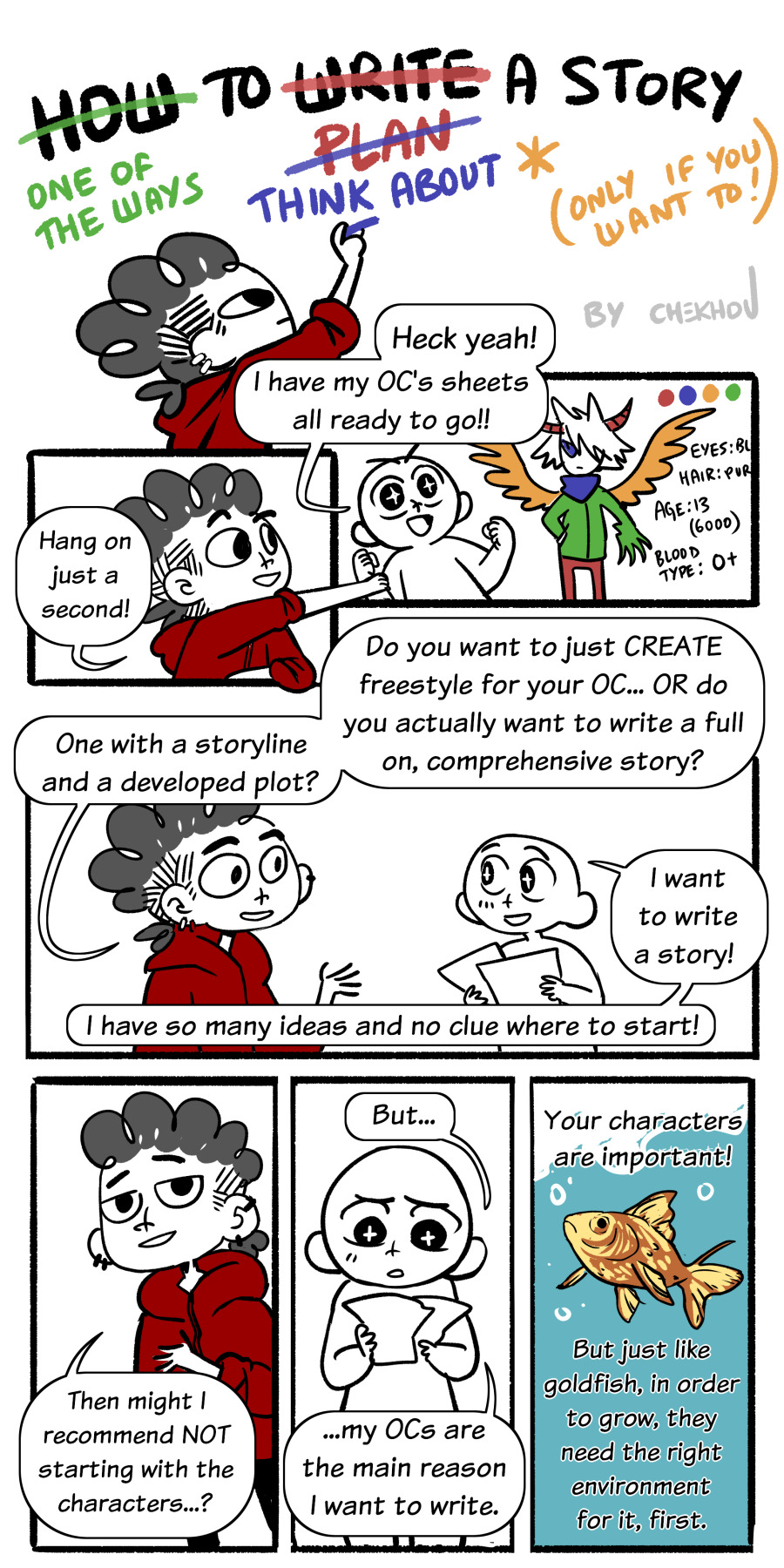
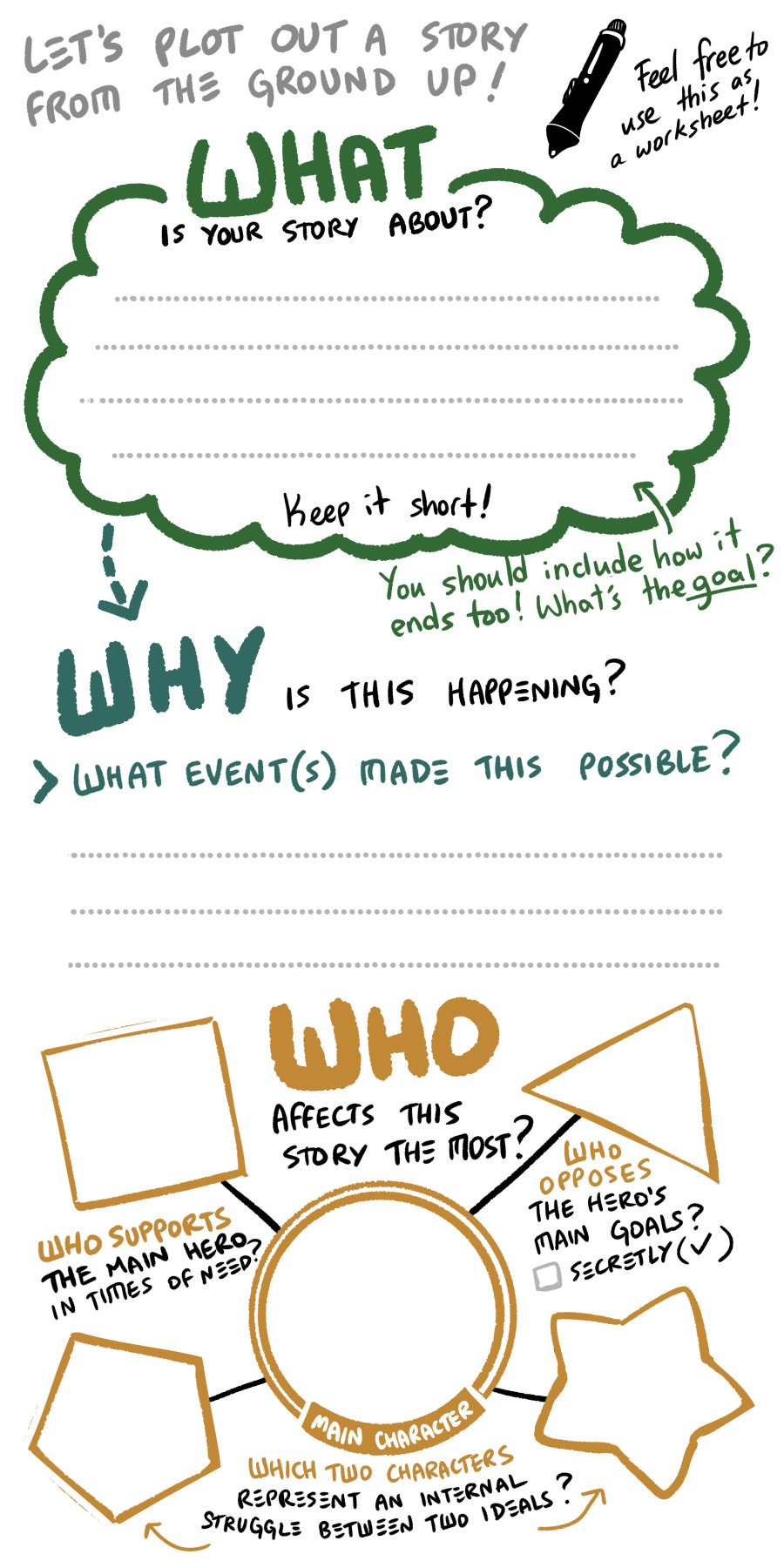
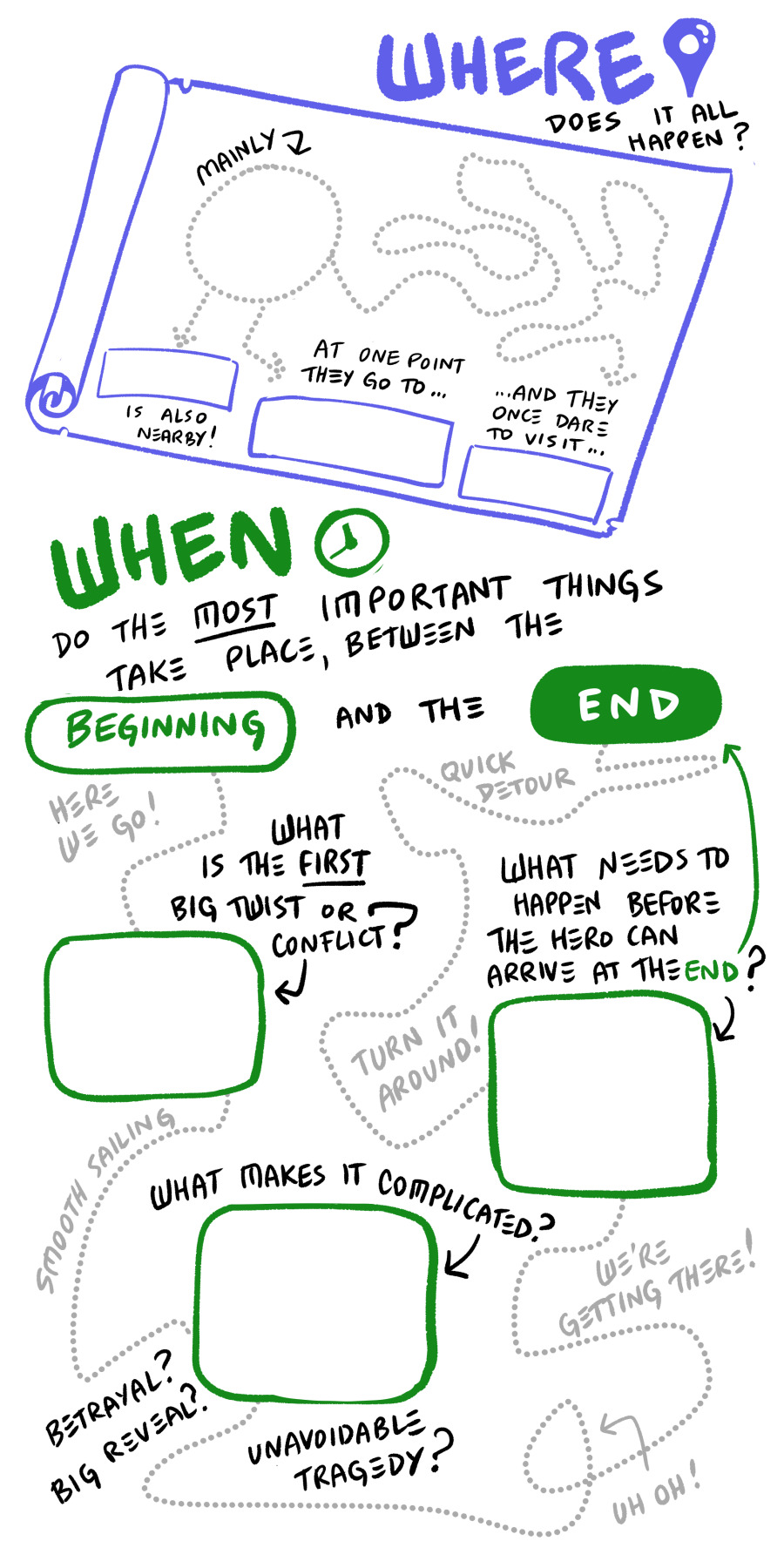
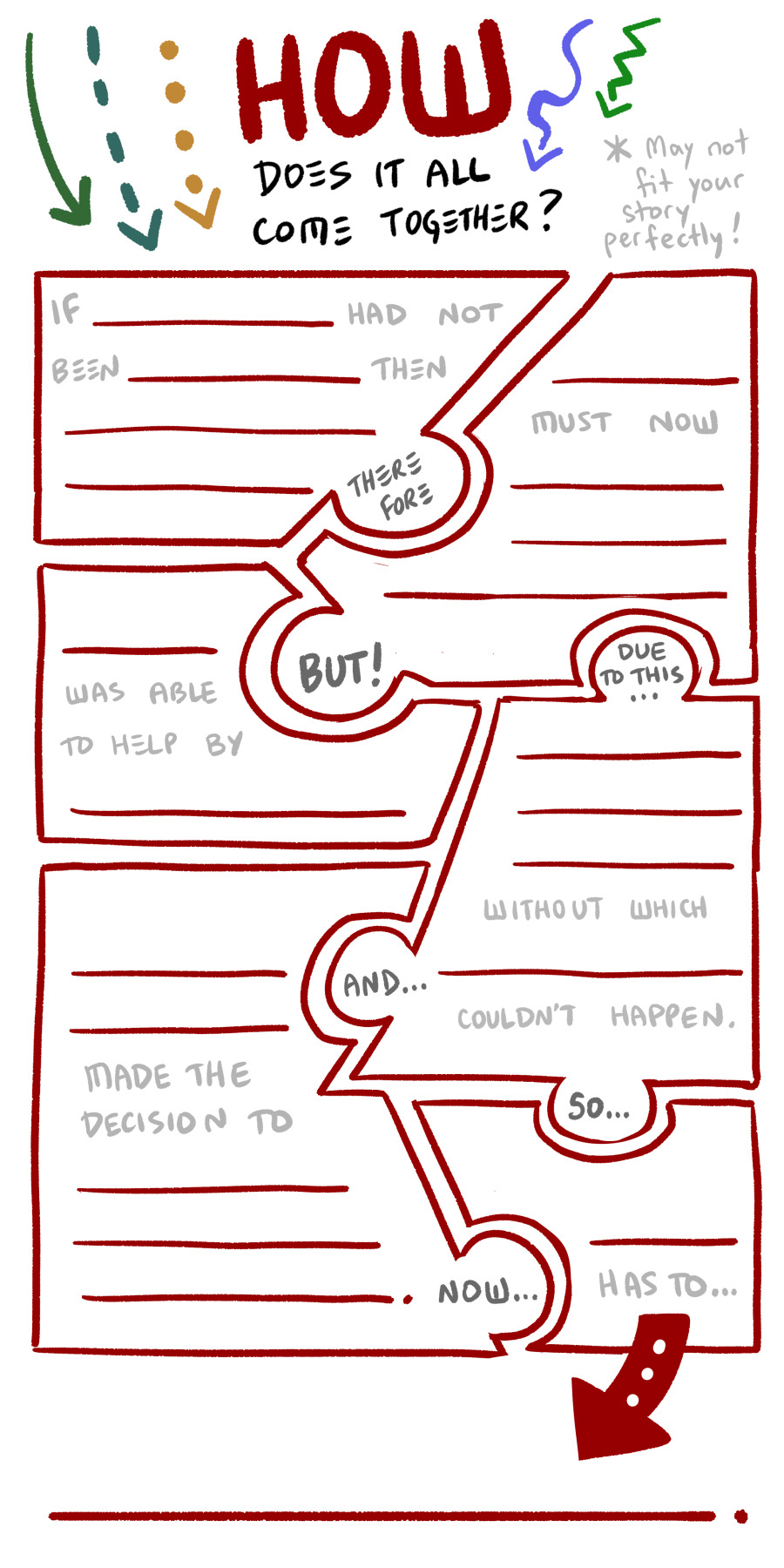
I've had this little idea in my head for a while now, so I decided to sit down and plot it out.
Disclaimer: This isn't meant to be some sort of One-Worksheet-Fits-All situation. This is meant to be a visual representation of some type of story planning you could be doing in order to develop a plot!
Lay down groundwork! (Backstory integral to the beginning of your story.) Build hinges. (Events that hinge on other events and fall down like dominoes) Suspend structures. (Withhold just enough information to make the reader curious, and keep them guessing.)
And hey, is this helps... maybe sit down and write a story! :)
28K notes
·
View notes
Text
Sorry, sorry, but manipulative hurt/comfort is fucking cocaine to me. The predatory aspect of it. The vulnerability—500% better if the hurt party knows they're being manipulated and is past the point of caring. The juxtaposition of sweet and sharp flavours. Barkbarkbark
17K notes
·
View notes
Text
Two rules for creating anything.
1) Make it weird.
2) Make it with love.
43K notes
·
View notes
Text
I'm sorry but I have one draft that I never finished but I laugh every time I see it
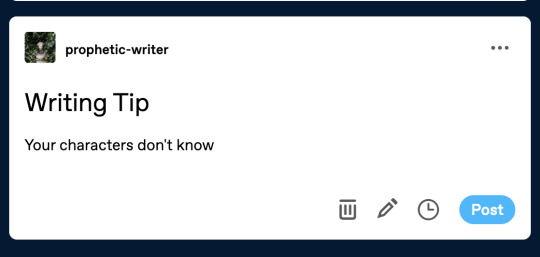
47K notes
·
View notes
Text
i do enjoy "living weapon" characters but specifically living weapons who did in fact do absolutely horrific things which at least a part of them enjoyed and thought was good and right at the time, and that no amount of not knowing any better or guilt they feel in hindsight will ever make up for. i love living weapons who are "irredeemable", and no it's not their fault that they were made that way or pointed in the directions they were by the hand that wielded them, and yes they are victims, but so were their victims. living weapons who some people will never be able to forgive, but who still wake up every day and try to do better than what's expected of them. a sword that uses its blade to cut wheat to make bread for the people who once lived in fear of its arc falling on their heads.
42K notes
·
View notes
Text
Do you ever start writing something that you’re excited about and that seems like it’s turning out well and that you’re getting eager to share, and then you start typing it up or doing an edit pass and it’s just awful it’s awful its premise is fundamentally flawed and it’s out of character and the prose is clunky and the plot is badly paced and ludicrous and the whole thing is embarrassing, how could you have done this, how could you have sunk so much time into this, you can’t even look at it, how is this that shining thing you were so excited about, how could you even have considered finishing it let alone sharing it with anyone, you’re crying, your mother is crying, nuns are spontaneously exploding in the streets,
46K notes
·
View notes
Text
This is a dangerous sentiment for me to express, as an editor who spends most of my working life telling writers to knock it off with the 45-word sentences and the adverbs and tortured metaphors, but I do think we're living through a period of weird pragmatic puritanism in mainstream literary taste.
e.g. I keep seeing people talk about 'purple prose' when they actually mean 'the writer uses vivid and/or metaphorical descriptive language'. I've seen people who present themselves as educators offer some of the best genre writing in western canon as examples of 'purple prose' because it engages strategically in prose-poetry to evoke mood and I guess that's sheer decadence when you could instead say "it was dark and scary outside". But that's not what purple prose means. Purple means the construction of the prose itself gets in the way of conveying meaning. mid-00s horse RPers know what I'm talking about. Cerulean orbs flash'd fire as they turn'd 'pon rollforth land, yonder horizonways. <= if I had to read this when I was 12, you don't get to call Ray Bradbury's prose 'purple'.
I griped on here recently about the prepossession with fictional characters in fictional narratives behaving 'rationally' and 'realistically' as if the sole purpose of a made-up story is to convince you it could have happened. No wonder the epistolary form is having a tumblr renaissance. One million billion arguments and thought experiments about The Ones Who Walk Away From Omelas that almost all evade the point of the story: that you can't wriggle out of it. The narrator is telling you how it was, is and will be, and you must confront the dissonances it evokes and digest your discomfort. 'Realistic' begins on the author's terms, that's what gives them the power to reach into your brain and fiddle about until sparks happen. You kind of have to trust the process a little bit.
This ultra-orthodox attitude to writing shares a lot of common ground with the tight, tight commodification of art in online spaces. And I mean commodification in the truest sense - the reconstruction of the thing to maximise its capacity to interface with markets. Form and function are overwhelmingly privileged over cloudy ideas like meaning, intent and possibility, because you can apply a sliding value scale to the material aspects of a work. But you can't charge extra for 'more challenging conceptual response to the milieu' in a commission drive. So that shit becomes vestigial. It isn't valued, it isn't taught, so eventually it isn't sought out. At best it's mystified as part of a given writer/artist's 'talent', but either way it grows incumbent on the individual to care enough about that kind of skill to cultivate it.
And it's risky, because unmeasurables come with the possibility of rejection or failure. Drop in too many allegorical descriptions of the rose garden and someone will decide your prose is 'purple' and unserious. A lot of online audiences seem to be terrified of being considered pretentious in their tastes. That creates a real unwillingness to step out into discursive spaces where you 🫵 are expected to develop and explore a personal relationship with each element of a work. No guard rails, no right answers. Word of god is shit to us out here. But fear of getting that kind of analysis wrong makes people hove to work that slavishly explains itself on every page. And I'm left wondering, what's the point of art that leads every single participant to the same conclusion? See Spot run. Run, Spot, run. Down the rollforth land, yonder horizonways. I just want to read more weird stuff.
20K notes
·
View notes
Text
Two rules for creating anything.
1) Make it weird.
2) Make it with love.
43K notes
·
View notes
Text
my favourite way to warm up or get the creativity flowing is just to write whatever comes into my head even if it's the word "nothing" over and over again or "oh my god why can't I think of anything... um uhhh... okay well, here's some words on the page. And here's some more. Oh look, more words!" and that sort of thing lol. sometimes some nonsense gets put onto the page that's interesting and I use it as a jumping off point for some "real" writing afterwards!
another thing I like to do is interview characters! ask them abt themselves and see how they answer! you can set that up in whatever way works best for you, I usually set it up like the word doc RPs I used to do with my sister LOL, where I start a new paragraph every time I switch between myself and the character speaking.
aaand my last tip is just to not take it seriously at first (or at all if that's your style!). it's art! it's playing with toys! have fun with it, and be patient with yourself - creativity is a muscle and writing is a skill, you're going to have to build it up again if you've taken a long break from it.
good luck !! i hope this helps a little :]
I made a new Gmail account so my private writing and my professional stuff could be separate
However I still am facing the blank page of Haven't Written Creatively Since I Was Seventeen. (Maybe ssris killed my sparkle but im also not wildly depressed 24/7 anymore so that's worth it.)
Help. Advice, prompts, challenges, whatever
2 notes
·
View notes
Text
Nothing worse than being obsessed with an ocs ship you haven't even properly written down yet
35K notes
·
View notes
Text
"How do you write such realistic dialogue-" I TALK TO MYSELF. I TALK TO MYSELF AND I PRETEND I AM THE ONE SAYING THE LINE. LIKE SANITY IS SLOWLY SLIPPING FROM BETWEEN MY FINGERS WITH EVERY MEASLY WORD THEY TYPE OUT. THAT IS HOW.
130K notes
·
View notes
Text

















Ohh, so I was looking at my storage and found these! I originally shared them on twitter before yeeting the platform. Anyway, feel free to use! Art memes for your oc :D
52K notes
·
View notes
